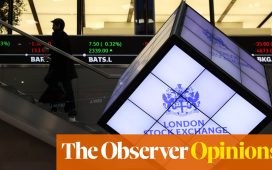M&S: High Court rules Secretary of State’s planning decision on Marble Arch store unlawful
Marks & Spencer has announced a breakthrough in its legal battle to demolish and rebuild its main store on Oxford Street in the West End of London.
The UK retailer says the high court has ruled that Michael Gove’s decision to block the redevelopment of its Marble Arch store was unlawful.
M&S brought a legal challenge against Gove, which was heard in the high court last month.
M&S operations director Sacha Berendji, says the court agreed with five of M&S’s six arguments against the secretary of state for Levelling Up, Housing and Communities.
The company brough the case after Gove disagreed with the recommendation from inspectors to approve the plans and refused permission.
Gove had refused permission for the demolition partly because it would “fail to support the transition to a low carbon future”, and would not encourage the reuse of existing resources, including the conversion of existing buildings.
Today, Berendji says:
Today’s judgment couldn’t be clearer, the Court has agreed with our arguments on five out of the six counts we brought forward and ruled that the Secretary of State’s decision to block the redevelopment of our Marble Arch store was unlawful.
The result has been a long, unnecessary and costly delay to the only retail-led regeneration on Oxford Street which would deliver one of London’s greenest buildings, create thousands of new jobs and rejuvenate the capital’s premier shopping district.
The Secretary of State now has the power to unlock the wide-ranging benefits of this significant investment and send a clear message to UK and global business that the government supports sustainable growth and the regeneration of our towns and cities.”
Opponents have said M&S’s project will release tens of thousands of tonnes of carbon into the atmosphere, and that refurbishment rather than outright demolition would be a better solution
The charity SAVE Britain’s Heritage had campaigned against M&S’s plan to demolish the Marble Arch store; they argue that repurposing and converting cherished buildings will save thousands of tonnes of CO2 and is “a no brainer”.
Key events
Property developers will welcome the high court’s ruling, says Vicky Fowler, head of planning at the law firm Gowling WLG.
“This long-awaited and landmark decision in relation to planning policy is likely to reverberate throughout the commercial real estate sector as it breathes a sigh of relief.
Developers should take comfort in the ruling and the fact that the NPPF does not (at least at the moment) come anywhere close to creating a presumption for the reuse of buildings.”
[NPPF = National Planning Policy Framework, which lays out the government’s planning policies for England]
Full story: M&S wins legal challenge over Gove’s block on Oxford Street store revamp

Zoe Wood
Marks & Spencer has claimed victory after Michael Gove’s decision to block a controversial plan to raze and redevelop its main store on London’s Oxford Street was ruled to be unlawful.
The levelling up secretary refused permission to redevelop the store near Marble Arch in the West End in July last year, in a win for campaigners concerned about the carbon footprint of the plan.
In August M&S mounted a legal challenge to that decision and on Friday morning a high court judgment revealed the judge had sided with the retailer.
The M&S operations director, Sacha Berendji, said the “judgment couldn’t be clearer”.
Berendji added:
“The court has agreed with our arguments on five out of the six counts we brought forward and ruled that the secretary of state’s decision to block the redevelopment of our Marble Arch store was unlawful.”
More here.
Why the high court ruled aginst the government
Today’s ruling that the government’s decision to block Marks & Spencer from rebuilding its flagship store in Marble Arch in central London was unlawful is online here.
It shows that M&S brought its case against the blocking of its demolition plan on six counts.
-
Ground One – the SoS erred in respect of paragraph 152 of the National Planning Policy Framework (“NPPF”) when he said in DL 24 that there is a “strong presumption in favour of repurposing and reusing buildings”;
-
Ground Two – the SoS erred in respect of the consideration of alternatives;
-
Ground Three – the SoS erred in the balance of public benefits as against the heritage impacts;
-
Ground Four – the SoS’s conclusion on the harm to the vitality and viability of Oxford Street, had no evidential basis;
-
Ground Five – the SoS made an error of fact in respect of the embodied carbon, and misapplied policy in respect of embodied carbon;
-
Ground Six – the SoS erred in his approach to analysing the impact of the proposals on the setting of Selfridges and the Stratford Place CA
Judge Nathalie Lieven ruled in favour of M&S on grounds one to four.
On ground 5, she says Gove “appears to have become thoroughly confused” about the rules for carbon offsetting, and thought they applied to embodied carbon rather than just to operational carbon.
Judge Lieven says that if the secretary of state had properly understood the policy he might have come to a different conclusion; but in any event, she is quashing the decision on the first four Grounds.
On the sixth point, related to heritage issues, she dismissed M&S’s argument.
A Department for Levelling Up, Housing and Communities spokesperson has commented on the court ruling, saying:
“We acknowledge the judgement and are considering our next steps.
It would be inappropriate to comment further at this stage.”
Today’s high court ruling on the M&S Marble Arch store will embarrass the government, argues James Souter, partner at Charles Russell Speechlys.
But, he adds, it doesn’t automatically mean M&S will now get permission to demolish the store….
This case goes to the heart of an uneasy tension between the protection of heritage assets, environmental concerns and developmental potential.
Today’s decision will be embarrassing for the Government, not least because of the public perception on the costs incurred. It could also give developers greater confidence in bringing forwards contemporary new-build schemes, even where the possibility of retrofitting existing structures is theoretically possible.
However, this does not automatically mean that planning permission will be granted – Gove will have to redetermine the appeal and could in theory still refuse planning permission.
Dee Corsi, chief executive at New West End Company, says M&S’s “successful appeal” against Michael Gove’s decision will provide clarity to developers who are redeveloping UK city centres:
“Today’s decision is a just result for Marks & Spencer, whose proposed development is a key part of Oxford Street’s and the West End’s future growth story. We are hopeful the successful appeal will now lead to enhanced clarity in the planning system for all developers to benefit from, whether they are pursuing a retrofit or a redevelopment. We like, Marks & Spencer, are in full support of a planning system which prioritises sustainable retrofits, where they are both commercially viable and have a clear environmental pay-off over the long-term.
“This added clarity can only be positive for our city centres – from flagship retail and leisure destinations, like Oxford Street, to local high streets – and would drive growth and investment within the U.K.’s property sector.
“The landmark decision to move forward on Marks & Spencer’s flagship redevelopment plans sends a positive signal to other investors that Oxford Street and the West End is a world-leading destination to do business.”
M&S: High Court rules Secretary of State’s planning decision on Marble Arch store unlawful
Marks & Spencer has announced a breakthrough in its legal battle to demolish and rebuild its main store on Oxford Street in the West End of London.
The UK retailer says the high court has ruled that Michael Gove’s decision to block the redevelopment of its Marble Arch store was unlawful.
M&S brought a legal challenge against Gove, which was heard in the high court last month.
M&S operations director Sacha Berendji, says the court agreed with five of M&S’s six arguments against the secretary of state for Levelling Up, Housing and Communities.
The company brough the case after Gove disagreed with the recommendation from inspectors to approve the plans and refused permission.
Gove had refused permission for the demolition partly because it would “fail to support the transition to a low carbon future”, and would not encourage the reuse of existing resources, including the conversion of existing buildings.
Today, Berendji says:
Today’s judgment couldn’t be clearer, the Court has agreed with our arguments on five out of the six counts we brought forward and ruled that the Secretary of State’s decision to block the redevelopment of our Marble Arch store was unlawful.
The result has been a long, unnecessary and costly delay to the only retail-led regeneration on Oxford Street which would deliver one of London’s greenest buildings, create thousands of new jobs and rejuvenate the capital’s premier shopping district.
The Secretary of State now has the power to unlock the wide-ranging benefits of this significant investment and send a clear message to UK and global business that the government supports sustainable growth and the regeneration of our towns and cities.”
Opponents have said M&S’s project will release tens of thousands of tonnes of carbon into the atmosphere, and that refurbishment rather than outright demolition would be a better solution
The charity SAVE Britain’s Heritage had campaigned against M&S’s plan to demolish the Marble Arch store; they argue that repurposing and converting cherished buildings will save thousands of tonnes of CO2 and is “a no brainer”.
Eurozone inflation dips to 2.6%
Just in: Inflation across the eurozone was stickier than expected last month, which may dent hopes of early interest rate cuts.
Annual consumer price inflation in the euro area dipped to 2.6% in February, new data from Eurostat shows, down from 2.8% in January.
That takes eurozone inflation closer to the official target of 2%, but was higher than the 2.5% which economists expected.
Eurozone inflation continued to come down in February, with the headline now at 2.6%. But those services prices are sticky, now responsible for half of headline inflation, which will make the ECB uncomfortable pic.twitter.com/EbR0P84gPo
— Pepijn Bergsen (@pbergsen) March 1, 2024
Food, alcohol & tobacco is expected to have the highest annual inflation rate in February, at 4.0%, down from 5.6% in January.
Services inflation was little changed, at 3.9%, compared with 4.0% in January, while inflation in industrial goods slipped to 1.6%, from 2.0% in January.
But energy prices provided less of a deflationary effect – they were -3.7% lower year-on-year, compared with a 6.1% fall in January.
In February alone, consumer prices rose by 0.6%, lifted by higher energy prices than in January.
Joshua Mahony, chief market analyst at Scope Markets, says:
A 0.6% gain for the month of February alone does dent hopes of a sharp decline back down to target in the coming months, feeding off the back of yesterday’s concerning 0.8% reading out of France.
With both headline and core inflation coming in above estimates, traders will be keeping a close eye out for any change in stance from the ECB at Thursday’s monetary policy announcement.
While today’s data looks unlikely to lessen the chance of a June rate cut, it does dampen any calls for a speedy return to easing in April.
UK manufacturing PMI: what the experts say
Despite the rise in this month’s UK Manufacturing PMI [from 47 to 47.5] the sector continues to contract, points out Michael McGowan, managing director of foreign exchange at Bibby Financial Services:
It’s clear that the pressure to tread carefully is bearing down on manufacturers as they look for ways to turn a profit.
“And geopolitical volatility isn’t making matters any easier. Whilst many may have hoped to see de-escalation in the Red Sea by now, the crisis drags on. For SME manufacturers in particular, events in the Middle East have only compounded the complex set of issues facing them at home – from inflation to high interest rates to the continued impact of Brexit on overseas trading.
Cara Haffey, manufacturing and automotive lead at PwC UK, says:
“Despite rising to a 10 month high of 47.5 in February, the UK Manufacturing PMI is still contracting and shows the ongoing disruption to global trade caused by events in the Red Sea and Suez Canal.
Manufacturers are continuing to do their best to circumvent these issues, as vendors and suppliers test the agility of their supply chains by sourcing alternate routes. However, rerouting supplies, such as around Southern Africa, as well as sourcing more local suppliers both carry added cost implications – which will not be welcome news for the sector.
Manufacturers continue to limp along after a full year of decline, says Fhaheen Khan, senior economist at Make UK, with the cost of living squeeze also hurting.
Manufacturers are now finding it is becoming increasingly more challenging to refill their orders pipeline, without which they will risk further cost cutting measures such as reducing headcount and investment to preserve their long-term viability.
It also reflects consumers shying away from spending with the higher cost of borrowing which rewards the cautious spender saving for a rainy day. The impact of this behavioural change, coupled with an increasingly stressed logistics sector due to ongoing tensions in the Red Sea has limited the access of materials and components and set the scene for a difficult year ahead for industry. Manufacturers will now need to be wary of potentially deteriorating economic conditions and act accordingly to shield against any further shocks.”
Worryingly, the employment index part of the UK manufacturing PMI has sunk to its lowest level since June 2020.
Factory bosses reported that lower employment reflected restructuring, redundancies and cost management programmes.
Excluding the COVID-19 pandemic, it was the worst reading since June 2009 (when the UK had fallen into recession after the financial crisis).
UK manufacturing downturn continues amid weak demand and Red Sea crisis
UK factories experienced supply chain disruption due to the Red Sea crisis last month, as activity fell again, a survey this morning shows.
UK manufacturing production fell for the twelfth month running in February, according to S&P Global’s monthly poll of UK purchasing managers.
New orders, output, employment levels and stocks of purchases all fell last month, as firms cut staff and also struggled with rising costs.
Some sought out alternative suppliers from more expensive markets closer to home, due to shipping firms avoiding the Suez Canal and taking the longer route around southern Africa.
Demand also remained weak, with new order intakes falling at the fastest rate since last October.
Overall, the S&P Global UK manufacturing PMI, which measures activity in the sector, rose to 47.5 in March, up from 47.0 in February. That’s better than the flash estimate of 47.1 recorded during last month, but still shows the 19th consecutive monthly drop in activity in the sector.
Rob Dobson, director at S&P Global Market Intelligence, says
“UK manufacturers faced challenging circumstances in February, as the ongoing impact of the Red Sea crisis delayed raw material deliveries, inflated purchase prices and impacted production capabilities. There were also knock-on effects for demand, as new export orders were hit by both supply disruptions and higher shipping costs. Production volumes subsequently contracted for the twelfth successive month while total new orders fell at the sharpest rate since October.
This dipruption also pushed up prices, Dobson points out, and caused delays:
Input cost inflation hit an 11-month high, leading to a further increase in selling prices. Average supplier lead times meanwhile lengthened to the greatest extent since mid-2022. Several manufacturers noted that they faced the difficult choice between accepting delays from re-routed shipping or facing the prospect of paying higher prices to source from closer to home.
This comes at a time of already heightened cost caution at manufacturers in response to weak demand, as highlighted by further cuts to employment, purchasing and inventories in February.
Any upward pressure on inflation will be a concern to policymakers, and may add to calls that it is too early to be confident on the timing of interest rate cuts, Dobson adds.
Eurozone factory recession continues
Euro zone manufacturing activity has contracted for the 20th month running,
The latest survey of purchasing managers at European factories shows that output fell again last month.
New orders and purchasing activity also contracted, but at the slowest rate since March 2023, according to data provider S&P Global.
This pulled the HCOB Eurozone Manufacturing PMI down to 46.5, from January’s 46.6, showing a faster contraction (50 = stagnation).
Looking into Eurozone Manufacturing PMI the report confirms that Union is in line with a subpar but still positive growth with recovery phase in place for large part of countries.
Expansion remains weak and subject to one-off, but Q3 weakness seems now well behind us… pic.twitter.com/CfiVSzhDXr
— Mario Cavaggioni (@CavaggioniMario) March 1, 2024
Dr Cyrus de la Rubia, chief economist at Hamburg Commercial Bank, says:
“The eurozone’s one-year industrial recession is not coming to an end. Output has declined again at the same pace as the previous month, mainly due to the heavyweights Germany and France. Spain, by contrast, is the first of the leading four euro countries to re-enter growth territory. On a slightly more positive note, the decline in new orders in the Eurozone has softened somewhat, offering a glimmer of hope for a potential demand recovery in the future.”
The survey also shows that Middle East tensions caused some delays to Europe’s manufacturing sector, de la Rubia adds:
“The attacks by the Houthis on commercial vessels in the Red Sea have had a temporary impact, leading to a brief lengthening of delivery times in January, followed by a subsequent reduction in lead times in February.
Consequently, the softer decline in input prices this month is unlikely to be wholly attributed to tensions in the Red Sea but rather to movements in commodity prices, such as the recent rise in oil prices. The fundamental trend of lower demand, which remains the primary driver of faster delivery times, continues to persist
In the crypto market, bitcoin has posted its strongest monthly performance in over three years.
Bitcoin gained almost 45% in February, helped by strong inflows into the new bitcoin ETFs (exchange traded funds) launched by major asset managers to track the world’s largest crypto asset.
That lifted bitcoin’s price by almost $19,000 last month – its biggest gain in dollar terms ever – from $42,447 on 1 February to $61,445 at last night’s close.
But, bitcoin ended February with something of a wobble – having hit almost $64,000 earlier in the week.
Jason Hollands, managing director at UK financial planning and investment management firm Evelyn Partners, says:
“Bitcoin’s resurgence looks like it’s being driven by its adoption into mainstream investment products in the US. In January, US regulator the Securities and Exchange Commission authorised the first spot Bitcoin ETFs, which began trading soon afterwards. A plethora of funds have been launched, including ETFs from major players like BlackRock, Fidelity and Invesco.
“The key point is that these spot Bitcoin ETFs – unlike futures or derivates-based instruments that existed previously – actually hold the digital currency, so as they gain inflows they must buy more of it and that is likely to increase the underlying price of Bitcoin. Not least because there is a well-documented limited supply, thanks in part to the ‘halving’ process.
The next halving event occurs in April, and will lower the supply of new coins.
Pearson eyes AI gains after profits rise
Jane Croft
Pearson, the London-listed digital learning group, has announced a further £200m share buyback and said it was well positioned to benefit from opportunities in artificial intelligence (AI) as it reported a 31% rise in full year adjusted operating profit of £573m in 2023, from £456m in 2022.
Pearson’s shares have jumped 4.4% to the top of the FTSE 100 leaderboard.
The company in recent years has transformed itself from a traditional textbook education group to focus more on digital and workplace training.
Omar Abbosh, a former Accenture executive and ex-president of industry solutions at Microsoft, who took over as chief executive of Pearson earlier this year from Andy Bird, said on a media call on Friday that Pearson had expanded generative AI study tools to help students and was well placed for future growth.
Abbosh said:
“The secret sauce for AI is data. In Pearson we have a vast array of data sets which will make us a winner in AI.”
…adding that the world was at an “inflexion point” with AI as more companies looked to train staff for jobs augmented by the new technology.
The company, which generates most of its earnings in the US, came under pressure last year from Cevian Capital, its largest shareholder, to move its listing from London to the US. The proposal comes at a time when London is fighting to keep listed companies after companies such as CRH, the building materials group, and Ferguson, the UK-based plumbing equipment supplier, decided to shift their primary listings from London to New York.
Abbosh was asked about the London listing and replied that his focus remained on shareholder value and organic growth. He said he would”listen very carefully to ideas” and “ would look at the pros and cons..” but had yet to begin his first investor roadshow.











